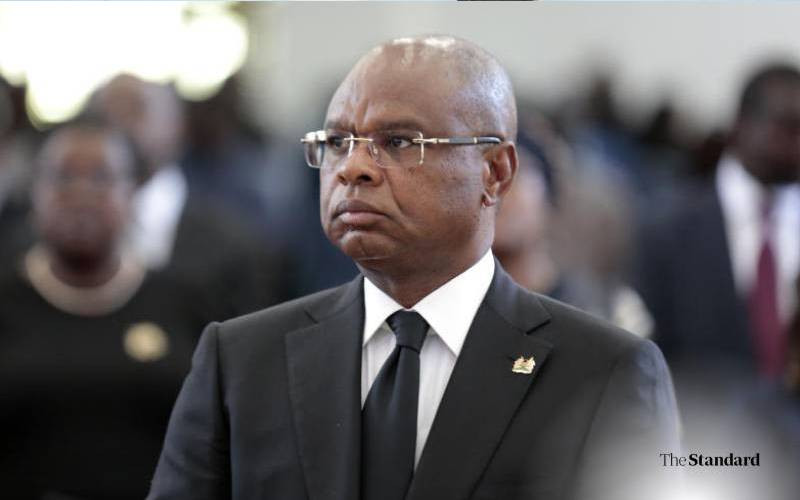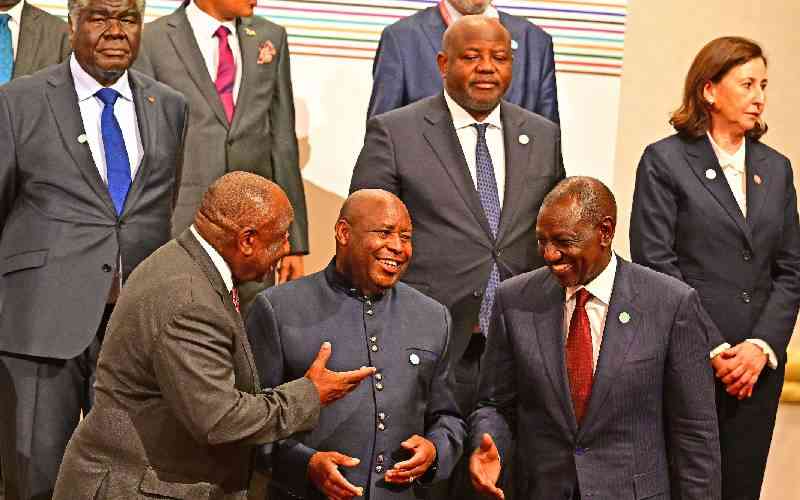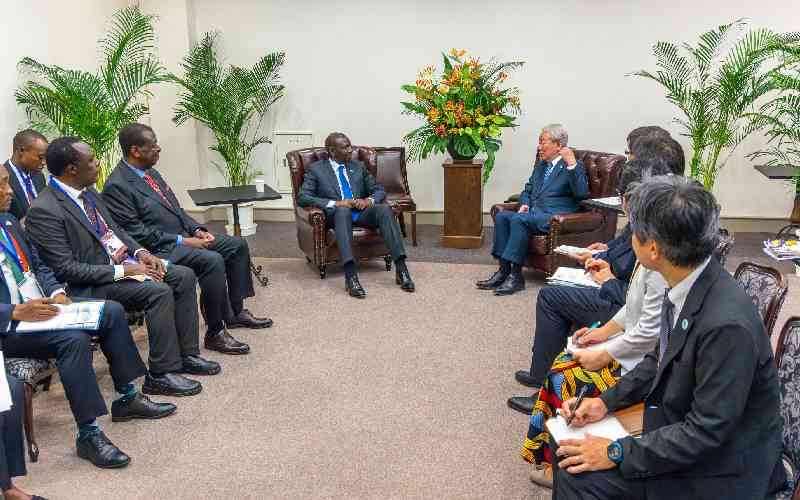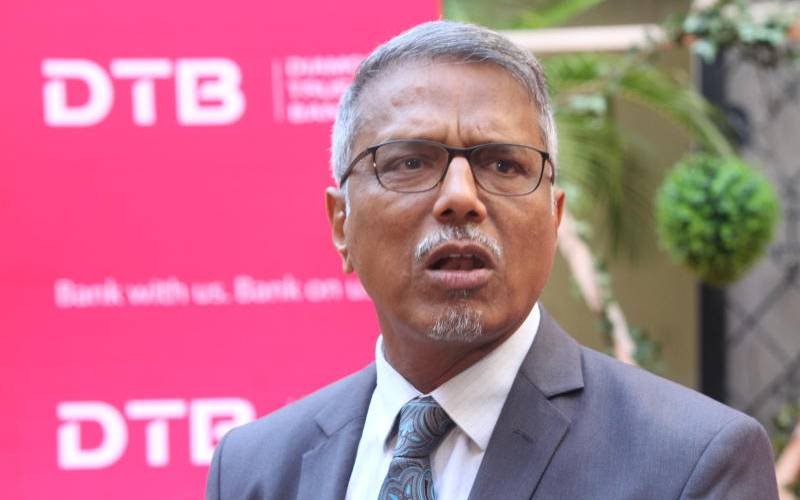
Senate Speaker, Amason Kingi has now come to the defense of the House saying he has not received any complaints or information relating to bribery or extortion or any other corrupt practice against a Senator.
He made the statement yesterday, a day after heavy condemnation from a section of Senators, who accused him of failing to protect the Senate from external attacks.
“As the Speaker of the Senate, I have not received any complaint or information relating to bribery or extortion or any other corrupt practice against a Senator from a member of the Executive, Ministries, Departments or Agencies of Government, a Governor or other County Government Agencies. If I do receive such a complaint, I am obligated and I will take the necessary action without delay,” he said yesterday during a special sitting.
READ ALSO: Speaker Kingi to Uhuru: Stop inciting Kenyan youth against government
He made an ‘impassioned plea’ to the Executive, other agencies of Government, County Governments and all other persons to protect the institution of the legislature which is the cornerstone of democracy.
“Holding the legislature to account and requiring the highest standards of integrity is laudable but it needs to be followed by collaborative action with the Legislature itself by favouring the appropriate offices of the Legislature with the information available to the Executive and to other agencies so that the Legislature can invoke the mechanisms at its disposal to take swift and stern action against any errant Members,” he insisted.
He urged the Executive, agencies and all Kenyans to support the Senate in its oversight role in defending devolved system of government which the people painstakingly weaved together for themselves in order to address the disparities and inequalities and other injustices of the previous centralized constitutional order.
The Speaker made the communication having met with the leadership of the Senate across the political divide met yesterday, where they and noted with concern, the allegations of bribery and extortion made against the institution of Parliament in general and the Senate in particular.
Kingi also stated the leadership of the Senate has noted that the allegations have not included material particulars, including, the specific individual Senators against whom the allegations of bribery and extortion are made.
“Senators are called to a very high office of responsibility and accountability and are required under the Constitution to live up to a very high standard of integrity and accountability. This is the thrust of a number of provisions of the Constitution, including Articles 1(3) and Article 10 as well as Chapter 6 on the leadership and integrity of State officers,” he said.
According to Kingi, Senators take and subscribe to an oath of office to obey, respect, uphold, preserve, protect and defend the Constitution and it follows that allegations of bribery and extortion made against Senators merit the most urgent and deliberate action and intervention.
READ: Will Kingi, Ali and Jumwa exit sink Kenya Kwanza?
He said fighting corruption requires a systematic and integrated approach in which all the organs of the Government collaborate and cooperate to the extent of their respective spheres.
To this end, while there exist constitutional and statutory agencies for preventing, detecting and prosecuting corrupt acts and while the Judiciary adjudicates on such matters, the Legislature too has robust mechanisms for addressing the vice.
Kingi made reference to the Parliamentary Powers and Privileges Act, Cap. 6 of the Laws of Kenya, saying it has an elaborate framework for Parliament to deal with errant legislators.
Stay informed. Subscribe to our newsletter
Section 15(5) of this Act mandates the Committee of Powers and Privileges, which is chaired by the Speaker, either of its own motion or as a result of a complaint made by any person, to inquire into the conduct of a member whose conduct is alleged to constitute breach of privilege in terms of section 16, within fourteen days of receipt of a complaint and to make recommendations to the House for its appropriate action.
“Part of the conduct that is prohibited under the Act includes improper influence of Members of Parliament, fraud, intimidation, offer or promise of any inducement or benefit of any kind of a Member in the performance of the Member’s functions. It is prohibited for Members to solicit, receive or accept any fee, compensation, gift, reward, favour or benefit of any kind to undertake or to forego to undertake their functions,” he said.
For the Senate to invoke this framework, he said it is most helpful that the information available to the Executive and other organs and agencies and other persons is shared with the Senate.
Kingi also said concerns have been expressed about the manner in which the Senate has prosecuted its mandate relating to the impeachment hearings for proposed removal of State officers.
According to Kingi, the conduct of the Senate in matters impeachment is a matter of public record and does not show any consistent pattern of acquittals or confirmation of impeachment charges.
Of the 19 impeachment proceedings that the Senate has undertaken since 2014, he said that in eight instances, the Senate has found the charges against a State officer to have been substantiated and has confirmed the impeachment, while in nine instances, the Senate found the charges not to be substantiated and has not confirmed the impeachment against the State officers.
In two instances, the Senate has dismissed the proposed impeachment for failure to meet the threshold of the law.
He insisted that the Senate has conducted the impeachment proceedings in accordance with the Constitution and the laws and has made its determinations on the basis of the evidence and the law.
“In this respect, as in the other matters, the Senate welcomes information and evidence of inducement or other impropriety by any Senator for appropriate action to be taken,” he said.
Similarly, he said, statements have been made questioning the constitutional mandate of the Senate to oversight a particular category of State officers; namely County Governors.
Here, he said, it has been contended that the oversight role of the Senate should be limited to the national government and that oversight over County Governors is the preserve of County Assemblies.
But Kingi said Article 96 of the Constitution sets out, as part of the role of the Senate, to represent the counties and to protect the interests of the counties and their governments.
Also, Article 96(3) is explicit, that the Senate determines the allocation of national revenue among counties, as provided for in Article 217 of the Constitution and exercises oversight over national revenue allocated to the county governments.
At the same time, he made reference to Article 125 of the Constitution decrees that either House of Parliament and any of its committees has power to summon any person to appear before it for the purpose of giving evidence or providing information.
“Apart from the clear provisions of the Constitution on the matter, the superior courts have made a number of decisions addressing the question of the jurisdiction of the Senate to summon and exercise oversight over County Governors and other County Government officials and the demarcation of the oversight function between the Senate and County Assemblies,” he affirmed.
He cited the High Court Petition No. 334 of 2016: Kyalo Kamina versus the Senate and Others, where the court held as follows on the question of the oversight responsibility of the Senate, which indicated that the Senate and County Governments are to work together to ensure that the purpose of devolution is achieved.
Similarly, the Supreme Court in Petition No. 24 of 2019, between the Senate and the Council of County Governors and Others, while also considering the issue of the mandate of the Senate.
This petition stated that the purpose of the Constitution is to entrench good governance, the rule of law, accountability, transparency, and prudent management of public finances at both levels of Government.
“Such grand purpose cannot be served if either the Senate or County Assemblies begin to develop “centres of oversight/influence”. In this regard, the County Assemblies provide the first tier of oversight while the Senate provides the second and final tier of oversight,” he cited the petition.
In the long run, Supreme Court held that in the performance of its oversight role over County revenue, the Senate has powers to summon County Governors to answer any questions or provide any requisite information.
“On this matter of the oversight jurisdiction of the Senate, therefore, the Senate cannot yield or concede. Unless the Constitution is amended, the constitutional mandate of the Senate is not negotiable or discretionary. It is a solemn trust invested on the Senate which the Senate will continue to discharge faithfully and without fear or favour,” the Speaker stated.
The Senators were however dissatisfied over the fact that the Speaker did not allow them to ventilate on the issue and he subsequently adjourned the special sitting until next week, where the impeachment hearings for Kericho Governor Eric Mutai will commence.







